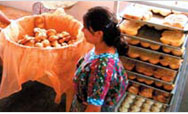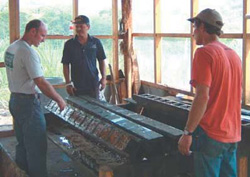 |
 |

 |
 |
You are here » Home » Telling Our Story
 |
USAID volunteers promote environmentally-friendly approach to sugar processing |
| Providing Ecological Livelihoods in Honduras |
|
Challenge
In the Taulabe, Comayagua region of Honduras, small sugar processors make a product called rapadura - a hard brown sugar that is sold in the local market. Traditionally, sugar cane processors had burned firewood as their primary source of fuel - however, firewood was becoming increasingly scarce. Processors shifted to the burning of old tires for fuel, causing environmental pollution, a low quality product, and serious health hazards to those who tend the fires and nearby communities.
|

Photo: Partners/Honduras Carlos Galvez
Farmer to Farmer volunteer Dan Baker works with Golden Aguilar and Peter Purington inside the molienda in Talulabe.
|
Initiative
USAID’s Farmer to Farmer program, working with Partners of the Americas, linked Vermont maple sugar makers with the Honduran sugar processors to find an appropriate technical solution to a serious local problem. The Honduras Ecological Sugar Project aims to improve sugar processing methods, reduce contaminants, eliminate the need to use tires as fuel, and improve the quality of the final product in an environmentally sustainable way. Moreover, the project transfers marketing concepts and techniques for increasing the return on sugar, while diversifying into value-added sugar products.
|
Through an innovative adaptation of maple sugar technology, Farmer to Farmer volunteers from Vermont constructed an improved evaporator that replaces the flat bottom pans with a more efficient flue pan. This new technology uses sugar cane fiber as fuel. Since this is the organic waste from the plant itself, it helps improve processing in an environmentally sustainable way. Product quality was also improved by reducing the introduction of contaminants though simple technologies that protected cane juice from press lubricants. Between the flue pan and an improved quality of the cane juice, a high quality sugar cane product was produced without the need to burn tires.
Results
Significant progress has been made for small-scale sugar producers and the community in Taulabe. There is a decreased demand for scarce firewood and a dramatic reduction in the amount of rubber tires being burned for sugar processing. More efficient and cost-effective sugar production methods, and improving business practices have made the small producers more competitive in local markets. Other economic impacts include the identification of niche markets for ecologically-produced sugar and the production of value-added products such as granulated sugar, cane syrup and hard candy, allowing for diversification and broader market exposure. The community at large has greatly benefited since the municipality of Taulabe approved an ordinance banning tire burning, as evidence of the new system’s economic viability continues to grow.
Print-friendly version of this page (257kb - PDF)
|
|
|
Back to Top ^
|
|
 |
 |
Fri, 31 Mar 2006 16:58:42 -0500
|
|
 |
 |


